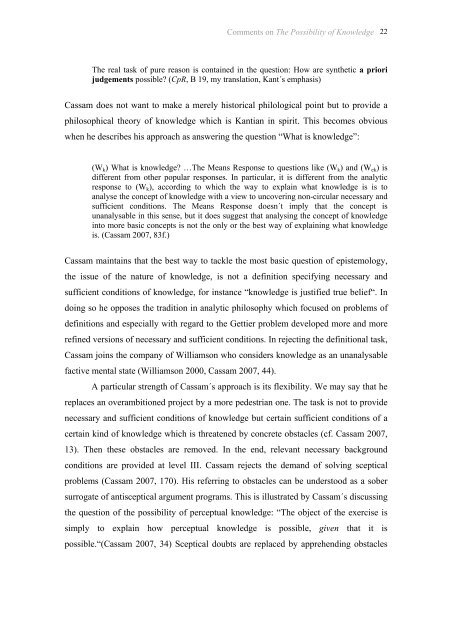Complete Issue in PDF - Abstracta
Complete Issue in PDF - Abstracta
Complete Issue in PDF - Abstracta
You also want an ePaper? Increase the reach of your titles
YUMPU automatically turns print PDFs into web optimized ePapers that Google loves.
Comments on The Possibility of Knowledge<br />
The real task of pure reason is conta<strong>in</strong>ed <strong>in</strong> the question: How are synthetic a priori<br />
judgements possible? (CpR, B 19, my translation, Kant´s emphasis)<br />
Cassam does not want to make a merely historical philological po<strong>in</strong>t but to provide a<br />
philosophical theory of knowledge which is Kantian <strong>in</strong> spirit. This becomes obvious<br />
when he describes his approach as answer<strong>in</strong>g the question “What is knowledge”:<br />
(Wk) What is knowledge? …The Means Response to questions like (Wk) and (Wek) is<br />
different from other popular responses. In particular, it is different from the analytic<br />
response to (Wk), accord<strong>in</strong>g to which the way to expla<strong>in</strong> what knowledge is is to<br />
analyse the concept of knowledge with a view to uncover<strong>in</strong>g non-circular necessary and<br />
sufficient conditions. The Means Response doesn´t imply that the concept is<br />
unanalysable <strong>in</strong> this sense, but it does suggest that analys<strong>in</strong>g the concept of knowledge<br />
<strong>in</strong>to more basic concepts is not the only or the best way of expla<strong>in</strong><strong>in</strong>g what knowledge<br />
is. (Cassam 2007, 83f.)<br />
Cassam ma<strong>in</strong>ta<strong>in</strong>s that the best way to tackle the most basic question of epistemology,<br />
the issue of the nature of knowledge, is not a def<strong>in</strong>ition specify<strong>in</strong>g necessary and<br />
sufficient conditions of knowledge, for <strong>in</strong>stance “knowledge is justified true belief“. In<br />
do<strong>in</strong>g so he opposes the tradition <strong>in</strong> analytic philosophy which focused on problems of<br />
def<strong>in</strong>itions and especially with regard to the Gettier problem developed more and more<br />
ref<strong>in</strong>ed versions of necessary and sufficient conditions. In reject<strong>in</strong>g the def<strong>in</strong>itional task,<br />
Cassam jo<strong>in</strong>s the company of Williamson who considers knowledge as an unanalysable<br />
factive mental state (Williamson 2000, Cassam 2007, 44).<br />
A particular strength of Cassam´s approach is its flexibility. We may say that he<br />
replaces an overambitioned project by a more pedestrian one. The task is not to provide<br />
necessary and sufficient conditions of knowledge but certa<strong>in</strong> sufficient conditions of a<br />
certa<strong>in</strong> k<strong>in</strong>d of knowledge which is threatened by concrete obstacles (cf. Cassam 2007,<br />
13). Then these obstacles are removed. In the end, relevant necessary background<br />
conditions are provided at level III. Cassam rejects the demand of solv<strong>in</strong>g sceptical<br />
problems (Cassam 2007, 170). His referr<strong>in</strong>g to obstacles can be understood as a sober<br />
surrogate of antisceptical argument programs. This is illustrated by Cassam´s discuss<strong>in</strong>g<br />
the question of the possibility of perceptual knowledge: “The object of the exercise is<br />
simply to expla<strong>in</strong> how perceptual knowledge is possible, given that it is<br />
possible.“(Cassam 2007, 34) Sceptical doubts are replaced by apprehend<strong>in</strong>g obstacles<br />
22




